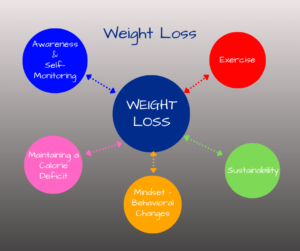We are all busy and on the go. We often eat while we are doing three other things. It’s easy to overlook the importance of mindful eating. However, incorporating mindfulness into your eating habits can be a game-changer for both weight loss and overall health. We will talk about what mindful eating is, its benefits for weight management and health, and provide practical tips to help you embrace a mindful approach to nutrition.
Understanding Mindful Eating
Mindful eating is more than just paying attention to what’s on your plate. It involves being fully present during meals, savoring each bite, and listening to your body’s hunger and fullness cues. By fostering awareness, you can break free from mindless eating habits and make more conscious choices. In short, we need to pay attention to the here and now, even when we are eating.
Benefits of Mindful Eating for Weight Loss
1. Reduces Overeating: Mindful eating encourages you to eat with intention, preventing overeating by tuning in to your body’s signals and stopping when you’re satisfied.
2. Improves Digestion: When you eat mindfully, your body can better digest and absorb nutrients, leading to better overall health.
3. Increases Enjoyment of Food: By savoring each bite, you’ll develop a greater appreciation for the flavors and textures of your meals, making the experience of eating more satisfying.
4. Better Relationship with Food: Mindful eating helps break the cycle of emotional eating, fostering a healthier relationship with food and reducing using it as a coping mechanism.
Practical Tips for Mindful Eating
1. Savor Each Bite: Take your time to chew and appreciate the taste, texture, and aroma of your food.
2. Eliminate Distractions: Turn off the TV, put away your phone, and create a calm environment to fully focus on your meal.
3. Listen to Your Body: Pay attention to hunger and fullness cues. Eat when you’re hungry and stop when you’re satisfied.
4. Mindful Portion Control: Be aware of portion sizes, and avoid the temptation to overeat by serving smaller portions and going back for seconds mindfully.
Strategies to Avoid Emotional Eating
1. Identify Triggers: Recognize situations or emotions that prompt emotional eating and find alternative ways to cope, such as going for a walk or practicing deep breathing.
2. Create a Support System: Share your journey with friends, family, or a support group to help manage emotional eating through communication and encouragement.
3. Keep a Food Journal: Track your emotions and the circumstances surrounding your eating habits. This can help identify patterns and develop healthier coping mechanisms.
Conclusion:
Incorporating mindful eating into your daily life can transform your weight loss journey and improve your health. By embracing the practice and implementing these practical tips, you’ll not only achieve your fitness goals but also develop a positive relationship with food that lasts a lifetime. Start your mindful eating journey today!



